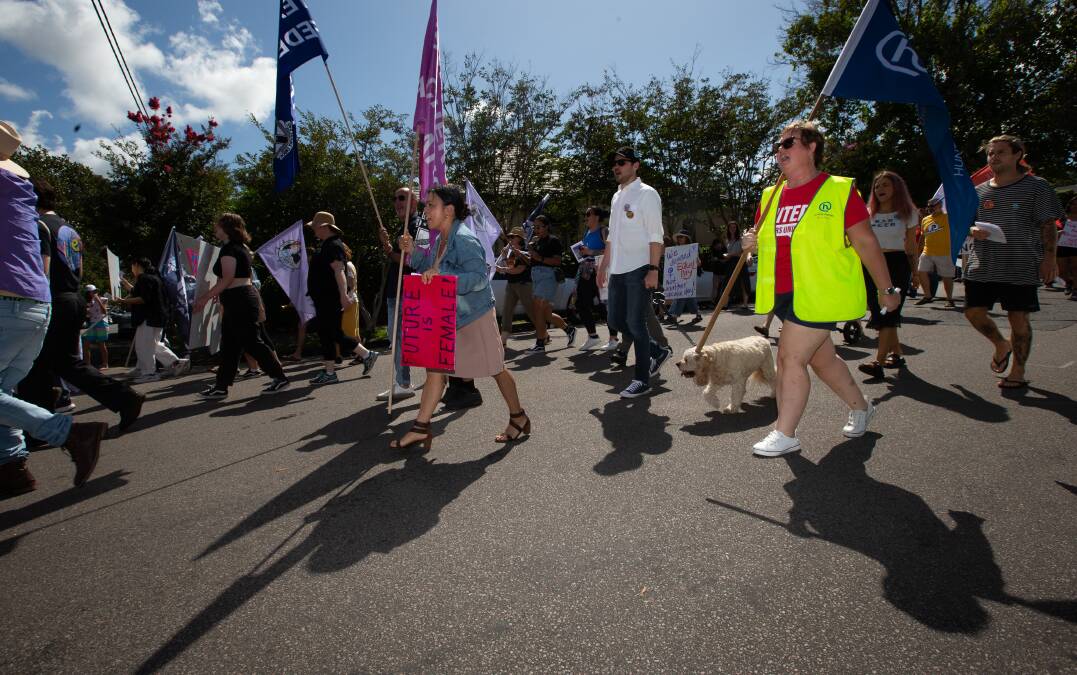A "small, but mighty" group of marchers earned plenty of attention on Beaumont Street Saturday morning in the name of women's rights.
More than 100 people marched from Gregson Park and along the Hamilton eat street for an International Women's Day event organised by Hunter Workers.
The event focused on issues facing women, including housing and homelessness, Aboriginal welfare, domestic violence and sexual assault.
Newcastle Labor councillor and Wiradjuri woman Deahnna Richardson spoke at the event about challenges she faced when she was pregnant with her first baby.
"Being Aboriginal is a risk factor in and of itself when it comes to pregnancy," she said. "Now I don't believe for a second there is anything physiologically different about us or how we birth out babies that makes our journey to motherhood riskier.
"What makes it riskier is the inherent racism and bias and assumptions that many care providers bring with them when they're caring for Aboriginal women.
"At my 22 week scan in 2018 a report diagnosed my daughter with symmetrical intrauterine growth restriction. It ruled out infection or syndromes and then said other causes would include external agents such as nicotine, alcohol, heroine or ionising radiation. They were the only things that were listed as a reason for having a small baby.
"I don't smoke. I wasn't drinking or on opioids but this report actually informed the rest of my care. The real cause of having a tiny baby was ultimately overlooked. I had pre-eclampsia, which is a serious but reasonably common pregnancy complication and it wasn't diagnosed until after my daughter was born.
"This is just my story but my story is in the context of generations of babies being taken from my ancestors."
Sarah Williams from What Were You Wearing used her speech to highlight domestic violence and sexual assault rates among marginalised communities, including people with disabilities, LGBTQI+ people and First Nations Australians.
"What Were You Wearing today, we have collected 20,345 stories from survivors of sexual violence - 20,345 people who trusted us share their story but are still dealing with the aftermath of assault," she said.



















Ms Williams said she believed the justice system needed improvement to better support survivors and ensure cases are taken more seriously.
"To all the women, trans and non binary people here today - remember to be fierce, challenge stereotypes and the norm, speak up when you see misogyny and sexism and racism," she said. "But most of all, remember your strengths and how proud we all are that you are still here."
Nissa Phillips and Seema Sanghi from Hunter Community Alliance spoke about the housing crisis and its disproportionate effect on women.
"I'm horrified by the raising rates of homelessness we are seeing and how gendered it is and how complex the tie is with domestic and family violence as well," Ms Phillips said.
"I'm also ashamed by how our society is treating our female elders, with single women over 55 being the fastest growing group of Australians experiencing homelessness at the moment.
"I am deeply appalled that First Nations people are over-represented in homelessness statistics as well."
The alliance has held two listening campaigns, one of which was about the homelessness and domestic violence.
Ms Sanghi said the alliance was holding candidate forums for the upcoming state election based on what they found in the listening campaigns.
They will call on candidates to commit to build more social and affordable housing across the Hunter and end no-grounds evictions in NSW.
"People are living in their cars, in tents, families are split up," Ms Sanghi said.
"Refuges are full because they cannot find social and affordable housing. The [social housing] waitlist in Newcastle is five to 10 years at the moment, and this is a massive shame.
"NSW is the only state in Australia where a landlord can turn up and say 'move out' with no reasonable ground. This has got to stop.
"We need to live in a stable and safe environment whether we are land owners or renters. We can't have landlords threatening people to move out because they asked for repairs.
"We can't have landlords threatening to evict people, just because they want to put up the rent. It's not on and we need this to stop."
- Support is available for those who may be distressed. Phone Lifeline 13 11 14; 1800-RESPECT 1800 737 732.
WHAT DO YOU THINK? Join the discussion in the comment section below.
Find out how to register or become a subscriber here.







